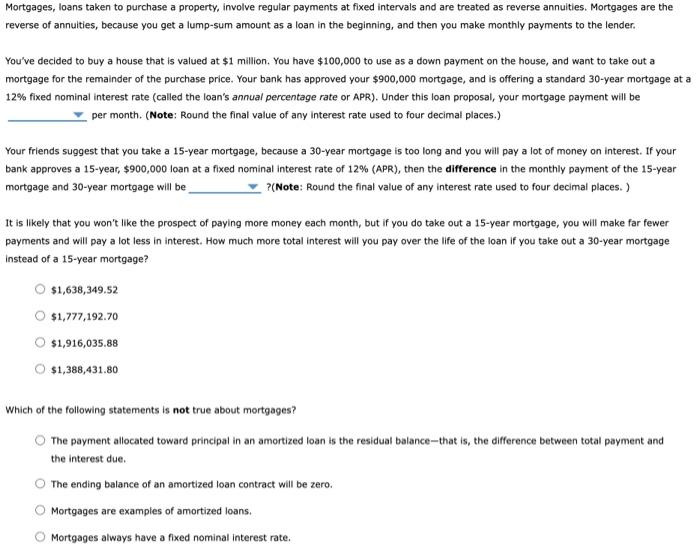Mortgages, loans taken to purchase a property, involve regular payments at fixed intervals and are treated as reverse annuities. Mortgages are the reverse of annuities, because you get a lump-sum amount as a loan in the beginning, and then you make monthly payments to the lender. You've decided to buy a house that is valued at $1 million. You have $100,000 to use as a down payment on the house, and want to take out a mortgage for the remainder of the purchase price. Your bank has approved your $900,000 mortgage, and is offering a standard 30-year mortgage at a 12% fixed nominal interest rate (called the loan's annual percentage rate or APR). Under this loan proposal, your mortgage payment will be per month. (Note: Round the final value of any interest rate used to four decimal places.) Your friends suggest that you take a 15-year mortgage, because a 30-year mortgage is too long and you will pay a lot of money on interest. If your bank approves a 15-year, $900,000 loan at a fixed nominal interest rate of 12% (APR), then the difference in the monthly payment of the 15-year mortgage and 30-year mortgage will be ?(Note: Round the final value of any interest rate used to four decimal places.) It is likely that you won't like the prospect of paying more money each month, but if you do take out a 15-year mortgage, you will make far fewer payments and will pay a lot less in interest. How much more total interest will you pay over the life of the loan if you take out a 30-year mortgage Instead of a 15-year mortgage? $1,638,349.52 $1,777,192.70 $1,916,035.88 $1,388,431.80 Which of the following statements is not true about mortgages? The payment allocated toward principal in an amortized loan is the residual balance-that is, the difference between total payment and the interest due. The ending balance of an amortized loan contract will be zero. Mortgages are examples of amortized loans. Mortgages always have a fixed nominal interest rate. You've decided to buy a house that is valued at $1 million. You have $100,000 to use as a down payment on the house, and want to take out a mortgage for the remainder of the purchase price. Your bank has approved your $900,000 mortgage, and is offering a standard 30-year mortgage at a 12% fixed nominal interest rate (called the loan's annual percentage rate or APR). Under this loan proposal, your mortgage payment will be per month. (Note: Round the final value of any interest rate used to four decimal places.) $11,571.89 pgest that you take a 15-year mortgage, because a 30-year mortgage is too long and you will pay a lot of money on interest. If your $14,349.14 a 15-year, $900,000 loan at a fixed nominal Interest rate of 12% (APR), then the difference in the monthly payment of the 15-year 30-year mortgage will be (Note: Round the final value of any interest rate used to four decimal places.) $12,497.64 $9,257.51 you won't like the prospect of paying more money each month, but if you do take out a 15-year mortgage, you will make far fewer davments and will pay a lot less in interest. How much more total interest will you pay over the life of the loan if you take out a 30-vear mortaage Your friends suggest that you take a 15-year mortgage, because a 30-year mortgage is too long and you will pay a lot of money on interest. If your bank approves a 15-year, $900,000 loan at a fixed nominal interest rate of 12% (APR), then the difference in the monthly payment of the 15-year mortgage and 30-year mortgage will be (Note: Round the final value of any interest rate used to four decimal places. ) It is likely that you won't like the prospe $2,238.80 nore money each month, but if you do take out a 15-year mortgage, you will make far fewer payments and will pay a lot less in intere $1,775.60 h more total interest will you pay over the life of the loan if you take out a 30-year mortgage Instead of a 15-year mortgage? $2,547.60 O $1,638,349.52 $1,544.00









